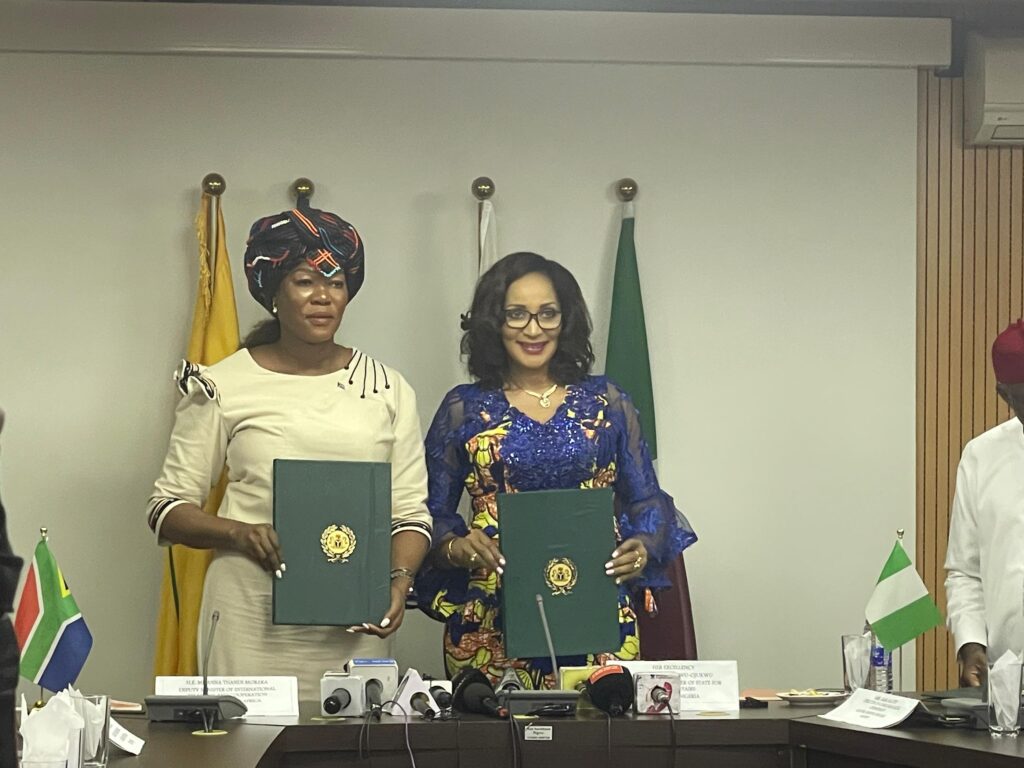By: Goodluck E. Adubazi, Abuja.
Nigeria and South Africa have reaffirmed their strategic partnership during a High-Level Political Consultation held on Tuesday, 21st October 2025, in Abuja.
During the meeting, the two African giants, Nigeria and South Africa—pushed for African Union (AU) reform, Agenda 2063 implementation, and G20 representation.
Speaking at the high-level ministerial meeting, H.E. Ms. Anna Thiandi Moraka, Deputy Minister of International Relations and Cooperation and Co-chair for South Africa, revealed that Nigeria and South Africa contribute a combined GDP accounting for over 30% of Africa’s economy. She added that both nations reaffirmed their responsibility to drive continental development under the AU’s Agenda 2063.
In a landmark step to deepen bilateral ties, Nigeria and South Africa concluded the first-ever Ministerial-Level Political Consultation, hosted at Tafawa Balewa House, the headquarters of Nigeria’s Ministry of Foreign Affairs, the statement noted.
The high-profile closing ceremony was co-chaired by Nigeria’s Minister of State for Foreign Affairs, Ambassador Bianca Odumegwu-Ojukwu, and South Africa’s Deputy Minister of International Relations and Cooperation, Ms. Anna Thiandi Moraka, representing their respective governments in a show of unity, diplomacy, and forward-thinking cooperation.
At the heart of the consultation was the signing of a long-awaited Memorandum of Understanding (MoU) on an Early Warning Mechanism, aimed at proactively addressing recurring consular challenges—particularly those affecting Nigerian nationals in South Africa.
Earlier, in her opening remarks, Ambassador Bianca Odumegwu-Ojukwu, Nigeria’s Minister of State for Foreign Affairs, acknowledged the continued reports of violence, abductions, and alleged extrajudicial killings of Nigerians, expressing Nigeria’s deep concern over the treatment of its citizens.
“We are optimistic that this Early Warning Mechanism will serve as a vital tool in preventing diplomatic frictions and ensuring swifter, more coordinated responses,” she said.
Meanwhile, Deputy Minister Moraka, in a moving speech, paid tribute to Nigeria’s unwavering support during South Africa’s darkest days under apartheid.
“Nigeria’s solidarity is etched in our national memory. Many South Africans owe their education and liberation to Nigerian generosity and leadership,” she said.
She reiterated that the shared history and solidarity must now evolve into strategic partnerships that address the modern aspirations of both nations.
During the session, the Defence and Security Working Group also featured prominently, with both countries reviewing outcomes from the sixth session of the Defence Committee (DEFCON), held in Abuja from September 1–5, 2025.
The ministerial session topics included joint operations, intelligence sharing, and law enforcement collaboration, with a renewed push to finalise pending agreements on mutual legal assistance, extradition, and police cooperation.
Nigeria–South Africa Bilateral Relations Target Industrial Growth and Youth Employment
The discussions followed up on commitments from the 11th Nigeria–South Africa Binational Commission (BNC) held in Cape Town in 2024. Key areas of cooperation include:
Mining and mineral beneficiation
Trade and investment facilitation
Infrastructure development (rail, ports, and energy)
Digital connectivity and artificial intelligence (AI)
H.E. Minister Moraka emphasised the importance of ensuring that Africa’s mineral wealth benefits its people, stating:
“Gone are the days when our resources are exported raw while our people remain unemployed. We must industrialise.”
She announced that Nigeria and South Africa will co-host the upcoming G20 Africa Outreach Summit on Industrialisation and Agriculture in Abuja, ahead of the G20 Heads of State Summit in South Africa this November.
The session concluded with the signing of a joint communiqué, reaffirming both countries’ shared commitment to regional peace (including in South Sudan, the DRC, and Gaza), economic integration, and sustainable development.

